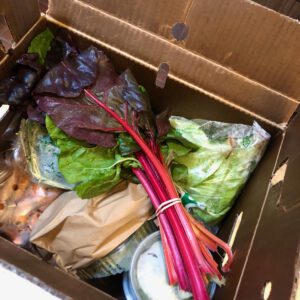What’s on Your Plate Lately?
By: Melissa Milton-Pung,
April 26, 2020
Food security is deeply embedded in local economic and financial stability, a core tenet of community wealth building, for both households and food producers. During the coronavirus pandemic, that kind of surety is ever more important for Michigan residents as we rely increasingly on existing local food systems.
As evidenced by the continued operations of grocery stores, the agricultural sector has been recognized as a critical industry. Prevailing recommendations have shown that the virus is unlikely to be spread by food—and people have still got to eat. Unsurprisingly, when we venture out for critical supplies, we can’t find everything we want at the stores. On the home front, we remain tasked with feeding our households as people are making do with food on hand or food available through nearby sources.
Despite the uptick in demand for groceries, a lot of Michigan produce has been going to waste. This is partly due to shutdown farmers markets, many of which are shuttered without guidance on proper social distancing to reduce virus transmission. It’s also because of the difficulties of the supply chain in converting direct purchase agreements from schools, institutions, and restaurants to domestic consumers or agencies feeding people in need.
Food producers have pivoted quickly in response, with rapidly innovated solutions such as:
Community Supported Agriculture (CSAs)
In the absence of weekly farmers markets, CSAs—seasonal produce subscriptions from local farms—are stepping up to the task with individual boxes that increase attention to sanitation and minimize the potential for contamination.
- Michigan State University Center for Regional Food Systems has a great article on picking a CSA.
- The Local Harvest CSA directory is a searchable and national food systems connector.
Online Sales Portals
Several leaders in the industry have quickly pivoted to aid growers and sellers in approaching the online sales world.
- Taste the Local Difference® has assisted farmers through a partnership with MSU Extension’s Washtenaw County Office and Product Center to promulgate best practices for food safety, strategies for sustaining food-based businesses, and online sales platforms.
- Ypsi Area Online Market in Ypsilanti has recently launched an online ordering portal, offering fresh produce, local food products, and meal kits.
- Grow Eastern Market in Detroit has knocked over barriers for continued wholesale commerce by developing a system of direct online ordering with drive through, contactless pickup.

Communities are becoming keenly aware of the need for effectively disbursing Supplemental Nutrition Assistance Program (SNAP) dollars due to increased allocations from the CARES Acts. Food assistance initiatives are particularly key as many households have been plunged unexpectedly into unemployment and may be now eligible for unfamiliar programs.
- Public school meal distribution programs continue to operate in various forms throughout the crisis, serving children up to age 18 and youth with disabilities up to age 26.
- The USDA launched an increased effort and the Michigan Farm to School program continues to respond with timely support.
- The Double-Up Food Bucks program has been expanded during the crisis for use in purchasing fresh produce, along with the WIC Expanded Food Choices.
- Advocates are presently seeking solutions to improve transactions for Bridge Card clients when using SNAP dollars for orders.
Civic leaders can serve as coordinators or conduits of information in these rapidly adapting food chains, and where applicable, they can help in determining how to respond. A handy reference on this topic is the Guidance document published by the Michigan Farmers Market Association (MIFMA) on safe practices/social distancing for market food sales. The League is monitoring evolving policies, providing technical assistance, and advising local leaders with direct connections to city-sponsored farmers markets as well as nonprofit markets. We continue to look for ways to support safe food sales practices and the persistence of a multi-faceted Michigan local economy.
For more information on farmers markets in Michigan, visit the League’s Placemaking site here.

